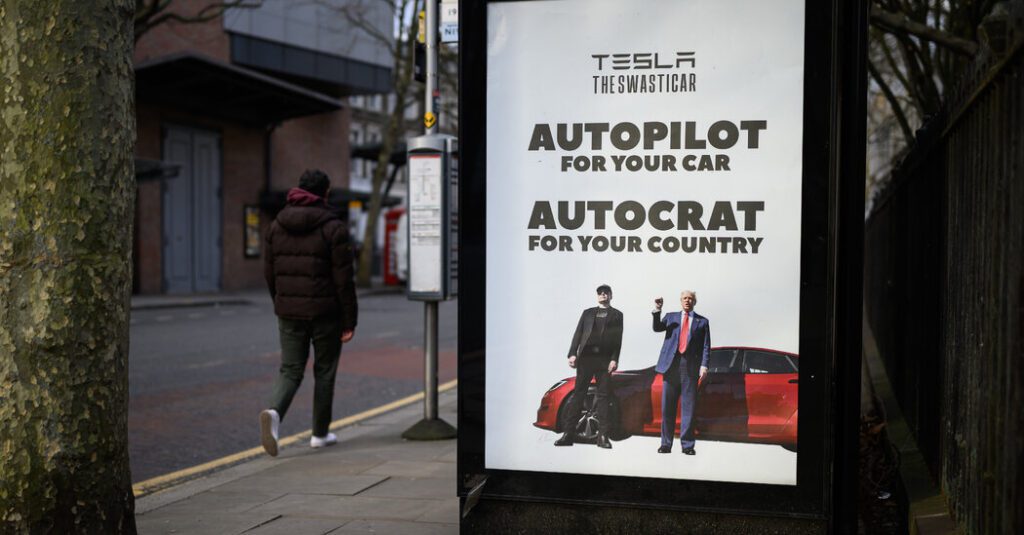Elon Musk and Tesla Under Fire: Political Satire and Protests in Europe
Emerging Trends of Political Satire
Over the past two months, London has witnessed the rise of provocative satirical posters targeting Elon Musk, the CEO of Tesla and one of the wealthiest individuals in the world. These public displays, rich with political commentary, are part of a broader campaign expressing discontent with Musk’s actions and views.
Satirical Messages Across the Capital
One such poster at an East London bus stop features Musk emerging from a Tesla, saluting with a caption reading, “Goes from 0 to 1939 in 3 seconds. Tesla. The Swasticar.” Another ad juxtaposes Musk with former President Trump, claiming, “Now With White Power Steering.” Fake movie billboards like “The Fast and the Führer” have further fueled the discourse, with warnings highlighting the political stances associated with Tesla’s leadership. These artistic protests are largely attributed to a group named “Overthrow Musk,” which explicitly calls for awareness of Musk’s perceived far-right activism.
Anti-Musk Sentiment Beyond London
The sentiment against Musk is not confined to London; it has prompted similar reactions across various European cities. Protests have manifested not only through the creation of eye-catching visual art but also through acts of political satire deeply rooted in the British tradition. Groups such as the Center for Political Beauty in Germany have made headlines by projecting messages onto Tesla factories, blurring the line between art and activism.
Grassroots Organization and Protest Movements
Grassroots organizations are increasingly mobilizing against Musk, inspired by his polarizing persona. John Gorenfeld, co-founder of “Takedown Tesla,” described their activities, such as car bumper stickers encouraging Tesla owners to reconsider their support for the brand, making it clear that the protests aim to challenge Musk’s power without resorting to violence.
Amplifying Global Discontent
Political rhetoric and public discourse around Musk have intensified due to his vocal support for far-right ideologies, especially on X (formerly Twitter), where he has amassed a following of 218 million. His actions and statements, particularly regarding sensitive subjects, including misinformation and calls for imprisonment of political figures in the UK, have galvanized opposition from small activist groups around Europe. Their goal is explicit: to diminish Tesla’s stock performance and alter public perception of Musk’s influence.
Protests: A Blend of Humor and Seriousness
Activists employ humor as a strategic tool to engage with a broader audience. Creative endeavors include balloon figures resembling Musk and humorous flyers left on Tesla vehicles, such as one declaring, “Driving a Tesla means you’re propping up Elon Musk, a man who promotes climate denial.” This blend of ridicule and critique reflects a sophisticated understanding of the importance of public perception and virality in the digital age.
Global Reactions to Tesla’s Market Position
Tesla has not been unaffected by these movements; reports indicate a significant decline in stock price and sales figures in recent months, coinciding with Musk’s controversial leadership over federal agency budget cuts in the U.S. Musk himself has downplayed the impact of these protests, suggesting they may represent buying opportunities for confident investors in the long term.
Conclusion: The Complex Interaction of Wealth, Power, and Activism
The ongoing protests and satirical initiatives against Elon Musk illustrate a complex interaction of wealth, power, and public sentiment in modern society. As activists strive to hold influential figures accountable, the mixture of humor and critique marks the evolving nature of political activism in an increasingly interconnected world.


